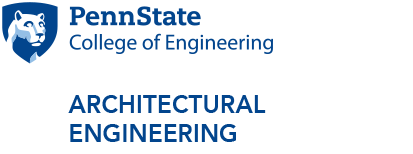Master of Engineering in Architectural Engineering
The Master of Engineering (M.Eng.) degree program in Architectural Engineering at Penn State prepares graduates for professional practice in the building industry and construction sectors. With curricula that balances theory with practical application, the M.Eng. in Architectural Engineering builds upon and expands students' knowledge in the planning, designing, constructing, operating, and maintaining of the built environment.
Diverse course offerings allow students to personalize their program of study and focus on an area within architectural engineering that best prepares them for their career of choice. Tailored option areas provide a blend of architectural engineering knowledge and professional development skills, which prepare students for a range of career pathways and advance their career potential.
The M.Eng. in Architectural Engineering is an intensive, non-thesis, 30-credit program. The curriculum’s built-in flexibility allows students to enroll in courses in a range of topics like construction robotics, energy efficiency, sustainable and resilient buildings, and human health and performance.
Below are descriptions of our four academic option areas in construction, lighting, mechanical, and structural engineering. Each option area includes two emphasis areas for further program customization.
Focus Areas
Construction
Students in the construction option area are prepared to take an active role in planning, designing, constructing, and operating building projects. Course topics include construction engineering and management, construction planning and project progress monitoring, smart and connected construction, construction safety using emerging technologies, construction automation and robotics, and construction worker health and safety.
-
Construction Automation, Sensing, and Robotics
This emphasis area is focused on new technologies that are poised to transform the construction industry. Students will gain an understanding of the challenges confronting automation, sensing, and robotics in the construction domain, a familiarity with the state of such technologies, a better understanding of automation and robotics, and the fundamental knowledge of the past, present, and future innovations in construction automation and robotics. - Construction Engineering and Management
This emphasis area is focused on the procurement, contracts, processes, methods, and technologies for integrative project delivery. Students gain first-hand exposure to projects implementing emerging methods and integrative processes.
Lighting
Students in the lighting option area develop the skills and knowledge to create high-quality lighting and daylighting systems that address occupant and client needs such as visual comfort, aesthetics, and energy efficiency. Course topics include the design and integration of electric lighting and daylighting systems, lighting controls, modeling and simulation, colorimetry, photometry, system optimization, psychological and physiological aspects of light, and energy implications of lighting and daylighting designs.
- Illumination Systems Design
This emphasis area is focused on building illumination systems and the lighting design process through the study of different light sources, lighting systems, optical control methods, and control equipment. It also focuses on the effects of optical radiation on human vision, psychology, and health. Students will apply this knowledge to the design of high-performance lighting systems through the development of design criteria, the selection of appropriate lighting/daylighting systems and control equipment, and the optimization of their designs through data collected via simulation.
- Integrated Daylighting Systems
This emphasis area is focused on high performance daylighting systems that deliver quality lighting to building interiors, are integrated with electric lighting, and control heat transfer across the building envelope. Students gain an understanding of daylight delivery systems, aperture sizing, the impact of site and orientation, and the performance of different glazing materials and shading options. Students also learn how to apply computational tools, including parametric modeling, to address integrated electric lighting and daylighting system performance and HVAC envelope loads.
Mechanical
Students in the mechanical option area combine a strong background in heating, ventilation, and air-conditioning systems with mechanical engineering thermal science fundamentals to design systems of high-quality thermal and indoor air quality environments. Course topics include indoor air quality, computational fluid dynamics, district energy systems, controls, and data analytics.
- Building Thermal Energy and Power Systems
This emphasis area is focused on applying data analytics tools and methods to energy use forecasting and energy-saving retrofits, detection and diagnosis of system operational faults, and energy management and controls. Students become advanced in uses of distributed energy technologies, renewable energy-powered sustainable design and performance analytics, and next-generation intelligent control strategies and technologies that promote resilient building and community-wide operations. - Indoor Air Quality and Thermal Environments
This emphasis area is focused on the fundamentals of indoor environmental quality related to sustainable and cost-effective heating, ventilation, and air conditioning systems that control air quality and comfort. Students will study air quality and thermal environments in depth, as well as data modeling using computational fluid dynamics, multizone modeling, and indoor environmental quality assessments.
Structural
Students in the structural option area focus on the application of building codes and advanced techniques to the design and analysis of building structural and envelope systems. Guided by an understanding of total building design, students will pursue advanced design of steel, concrete, wood, and masonry structures. Course topics include forensic engineering, façade design, automated structural health monitoring, data-driven parametric design, and optimization.
- Building Structural Design and Computation
This emphasis area is focused on the creative integration of computational techniques for structural design and analysis. In addition to learning the advanced design of steel, concrete, masonry, and wood structures, students can take courses involving advanced and evolving tools for building design, preparing them for professional practice in a building industry that increasingly uses code to manage information and make decisions from concept design through construction. - Forensic Engineering
This emphasis area is focused on innovative technology that can monitor, diagnose, analyze, and report on structural engineering system failures in contemporary construction and historic structures. Students also will gain exposure to the legal aspects of engineering and construction. Through a comprehensive understanding of current and emerging investigating techniques, advanced structural analysis, and accepted construction practices, students will be prepared to perform forensic studies and analyses on buildings and related structural and architectural systems.




